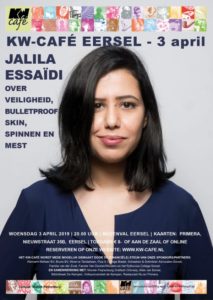KW Café
Eersel
Whirling closing night KW-season with Jalila Essaïdi about BioArt
Review by KW café from here.
The KW-public in the well-filled Muzenval was gasping for breath after an hour full of admiration. At a high pace Jalila, talking very calmly, opened a mostly new world for them. With constantly ‘nature’ as a starting point she has had a successful 10 years in the region, with the opening of her BioArt Village one year ago as one of the highlights. For the attendants it became very apparent how she manages to unite with so many parties and why she receives so many national and international awards. She is a clever (scientific), creative, entrepreneurial but primarily captivating, inspiring and ‘centre point-seeking’ person and strength. Needless to say after the break there was a crossfire of compliments and questions. As a correction: Jalila and her family have roots in Egypt and not in Morroco, as was stated earlier this evening.
Spiders
Jalila started her story with her fascination, ten years ago already, for spiders, the spider’s web and the spider’s thread. The hand-sized tropical Golden Weaver spider makes threads that are ten times stronger than steel wire. Today we use Kevlar for bullet-proof vests, 33 layers, with a steel sheet. The spider’s thread should be able to do that better, was Jalila her thought. A quest that ended in her Bullet-Proof Skin. This product immediately raises a few ethical questions. Is this the most desirable way to a safe society? Via this way Jalila came into contact with a great diversity of parties. Fibre company DuPont wanted to collaborate, academic hospitals, TNO, the Netherlands Forensic Institute… Everyone wanted to collaborate. The ministry, the Province and Brainport wanted to support her research.. But.. How does one build and test a bullet-proof skin? You wil need materials, laboratories, incubators, expertise, techniques and high-speed cameras. For the spider silk Jalila deployed genetically modified goats from the USA. And that is how you scale up from a creative DDW-researcher to Brainport-entrepreneur and you end up on Strijp-T. A fascinating story that’s still developing…
Manure
Also farmers’ union ZLTO reached out. We have excess manure, is there anything you can do with it, extracting raw materials? Another astounding story. Which started with collecting a bucket of manure at ZLTO-top executive and farmer Hans Huibers in Wintelre. And how, after endless attempts, the cellulose was extracted from the manure and transformed into clothing. Here too, a large amount of partners were needed (even from China, Germany) to make the ‘Mestic-thread’. And in the meantime, in collaboration with H&M, making sure Mestic-clothing became a positive concept. Interesting is how Jalila managed to keep the ‘fast money lads in Porsches’, the venture-capitalists, at a distance to be able to develop this on her own in peace, together with the farmers and her own money. All while also arranging the PR work by organising a Mestic fashion show at the Philips Fruittuin in the presence of, among others, Neelie Kroes.
Waste water
Water Board De Dommel (Waterschap De Dommel) called, is there anything useful BioArt Laboratories could do with the residual materials from the water treatment process, like the surfacing (frying) fats? In the meanwhile the Eindhoven municipality made Jalila an offer to tranform a plot with five (German) farmhouse-bunkers from WWII into a BioArt Village. Completely self-sufficient in terms of energy, water and waste treatment. Military engineering troops from Oirschot as well as 200 volunteers helped with this and for the DDW 2018 it was opened for the public for the first time. Now there was a space for ten yearly BioArt talents from all over the world to do research. During the KW night a large amount of results were released for the public. How radio amateurs could communicate worldwide via Tree Antennas: tree2tree! From ‘Grave Candles’ to glowing bacteria. The public was offered an unique view into the Son-Mat kitchen and food filosofy from Korea. With constantly ‘nature’ as a starting point and a simple and tangible result for the generation of NOW. The video clips showed to the KW-public were informative and poetic.
After the break
Does Jalila patent her findings? Yes, unless there is too much work involved! The Netherlands is, in this domain, very slowmoving, inert/expensive. How does she feel about genetic mutation and the possible risks involved? In the Netherlands there is a very strict legislation, the ‘gene-goats’ (a few million euros each!) are being taken good care of and are being pampered in Utah (US). Jalila does see the necessity of a good legislation regarding the matter. She expects to have genetically modified goats for her spider silk in Brabant before long. A lot of goat-questions: How doe you retrieve the spider silk from the goat’s milk, is de goat’s milk still drinkable, how many litres of milk do you need for one meter of spider silk? Animal manure, sure, but what about human manure? How do you manage this all financially? Cellulose from manure does also cost energy, is it not more cost- and energy efficient to just fell trees? All of the questions were followed by clear answers. Everything indicates that before us stands a ‘Top woman’, substantively, communicatively and personally/ethically strong and capable of retaining her partnerships. Yes, Jalila said, we need the government but… citizens/Kempen residents: take your own responsibility in this changing world. Stay curious. Jalila is ambassador for the upcoming Dutch Design Week, with her theme Water. She asked the public if they had any water-related matters they want to see resolved… and we got invited to visit her BioArt Village during the DDW. Oirschotsedijk 14-10, opposite the Philips Fruittuin. With a long final applause Jalila said her goodbye and the KW-season is a wrap.
Preface
The KW-café ends the season with a regional top-combi: science, bio-art and society. Jalila Essaidi has recently been appointed most influential women in the region by Frits Magazine and she is one of the Inspiring 50-women in the Netherlands! Jalila’s most famous work, Bulletproof Skin, is an in vitro grown human skin reinforced with spider silk derived from genetically modified goats and silk worms. This material stops a bullet with half the speed, but with normal speed it will go through. Why is this valuable? Jalila also explores the social, political, ethical and cultural issues surrounding safety in a (bio)technological world.
Jalila is specialized in the fields of modern biotechnology and biological art. A recent project, Mestic®, derives new raw materials like plastic, paper and textile from cow manure. This solution for the manura problem also generates new, durable materials which can then be used by the industry. With it, she won important international prizes like the H&M Global Change Award in 2017 and the Chivas Venture Award in 2018. In 2017 she started with the set-up of a BioArt Village in Eindhoven by transforming five old farmhouse-bunkers into a self-sufficient location with a laboratorium, exposition spaces and an experimental hortus botanicus.
Jalila Essaïdi (Eindhoven, 1980) acquired her Bachelor of Art at the Fontys College for the Arts in 2009. Subsequently, she studied bio-art at the Leiden University and did her Masters Course in Art Education in Tilburg. Essaïdi is director of Inspidere BV®, a biotech company based in Eindhoven. She is also director and founder of BioArt Laboratories and teacher at the Fontys College for the Arts.

Location
Muzenval Eersel
Website
https://www.kw-cafe.nl/
Date
April 3, 2019
Category
Talks


